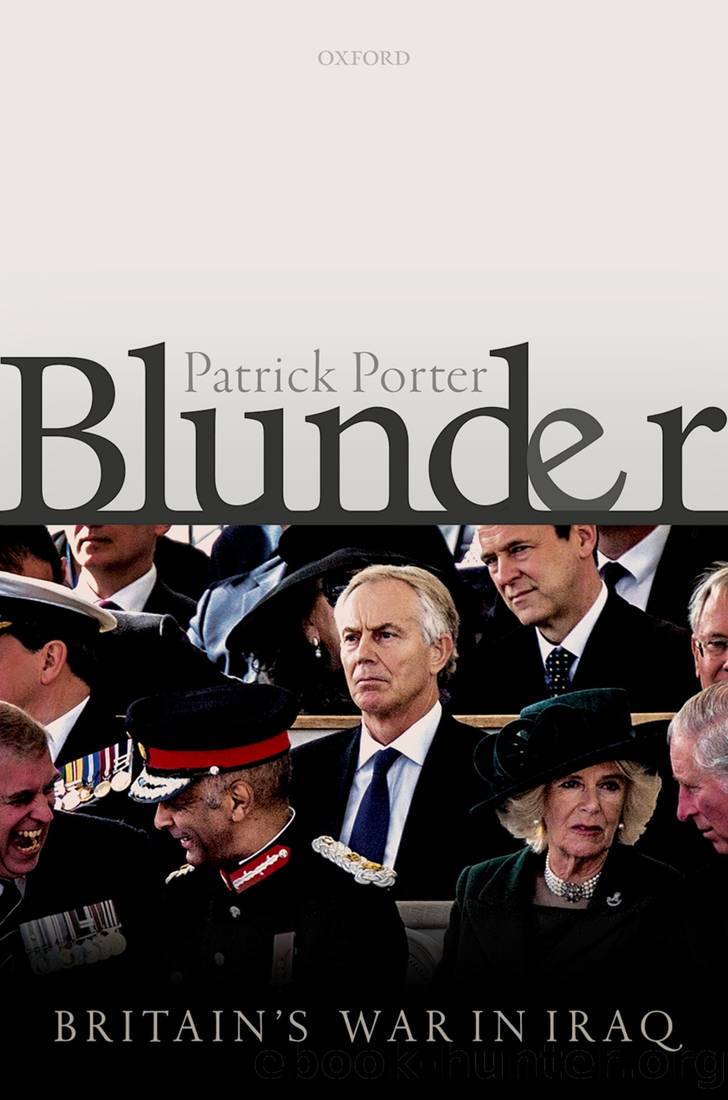Blunder: Britain's War in Iraq by Porter Patrick;

Author:Porter, Patrick; [Porter, Patrick]
Language: eng
Format: epub
ISBN: 9780198807964
Publisher: OxfordUP
Published: 2018-07-24T00:00:00+00:00
Part I. Liberalism, Realism, and War
A restatement of definitions is in order, as well as an account of âliberal warsâ and how to recognize them. Deudney and Ikenberry frame the issue in a way that âgamesâ the argument.
Realism is a pessimistic intellectual tradition that views international life as insecure and defined by the possibility of war, because the world is anarchic, or lacking a supreme, supranational sovereign.134 Without a âLeviathanâ to keep the peace, this condition of anarchy places a premium on self-help and a sensitivity to dangerous power imbalances. Realists often disagree on specific policies but are generally concerned for stability over progress, emphasize material capabilities, are wary of overzealous crusading, and are above all averse to the impulse to reinvent the world, and transform other countries, in oneâs own image and at oneâs own timetable. This translates into a general unease with waging wars to export American values. Most realists who whisper in princesâ earsâfrom George Kennan to Henry Kissinger to Brent Scowcroftâshare this orientation, though not all.
As America became a âunipolarâ superpower without a peer competitor to restrain it, most American academic realists directed their energy both to theory-building and to prophesying about the impermanence of unipolarity and the perils of overstretch. There were limits even to American power, they warned. Despite appearances, the triumph of Atlantic democratic capitalism under Washingtonâs stewardship would not permanently transform the world. Americans were not immune from the historical patterns whereby overexpansion generated resistance and counter-power. And they argued that Americaâs commitment to primacy, often euphemized as âleadershipâ, and to spreading the âdemocratic peaceâ made the country dangerously war-prone, and endangered the very democratic institutions they were supposed to protect. This critique grew more urgent as the Global War on Terror unfolded.135
Most senior realists of the academy opposed the Iraq War.136 They argued that the military adventure was not in the national interest, that overthrowing the Iraqi state would spread instability in the Middle East, that invading this divided society would lead to occupation for years, and that the US should focus its efforts on combating Al-Qaeda and to deterring Saddamâs adventurism. More broadly, they warned that the Iraq War was part of Washingtonâs overexpansion, an expansion driven by the lack of a major power competitor and by the motor of liberal ideology. Some observers, including realists critical of the Iraq War, trace a lineage from Woodrow Wilson to the âBush Doctrineâ in which the Iraq War was grounded.137
For Ikenberry and Deudney, realists who argued that their faith dictated opposition to Iraq, failed to understand the breadth and multiplicity of their own tradition. Realism, they rightly note, has several variants. The realism that apparently inspired Iraq was more to be found amongst the âpractical-operationalâ stable of realists within government. These realists proffered a twofold form of realism that has strong purchase in Washington. It was firstly âhegemonic realismâ or the pursuit of American primacy on the basis that order flows from favourable concentrations of power, and âinterdependence realismâ that stresses the
Download
This site does not store any files on its server. We only index and link to content provided by other sites. Please contact the content providers to delete copyright contents if any and email us, we'll remove relevant links or contents immediately.
| Arms Control | Diplomacy |
| Security | Trades & Tariffs |
| Treaties | African |
| Asian | Australian & Oceanian |
| Canadian | Caribbean & Latin American |
| European | Middle Eastern |
| Russian & Former Soviet Union |
The Secret History by Donna Tartt(18075)
The Social Justice Warrior Handbook by Lisa De Pasquale(11940)
Thirteen Reasons Why by Jay Asher(8414)
This Is How You Lose Her by Junot Diaz(6408)
Weapons of Math Destruction by Cathy O'Neil(5798)
Zero to One by Peter Thiel(5456)
Beartown by Fredrik Backman(5303)
The Myth of the Strong Leader by Archie Brown(5214)
The Fire Next Time by James Baldwin(4997)
How Democracies Die by Steven Levitsky & Daniel Ziblatt(4940)
Promise Me, Dad by Joe Biden(4897)
Stone's Rules by Roger Stone(4829)
100 Deadly Skills by Clint Emerson(4659)
Rise and Kill First by Ronen Bergman(4535)
A Higher Loyalty: Truth, Lies, and Leadership by James Comey(4530)
The David Icke Guide to the Global Conspiracy (and how to end it) by David Icke(4358)
Secrecy World by Jake Bernstein(4354)
The Farm by Tom Rob Smith(4303)
The Doomsday Machine by Daniel Ellsberg(4230)
